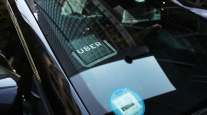Uber for Trucking Firm in China Valued at $1 Billion

Truck Alliance Inc., an Uber-type service for trucks known in China as Huochebang, raised about $115 million in a financing round that valued the startup at $1 billion.
The 2-year-old company backed by Tencent Holdings Ltd. and Hillhouse Capital secured the capital in a round led by new investors International Finance Corp. and All-Stars Investment Ltd. Tencent, Genesis Capital and DCM Ventures also participated, the startup said in a statement.
Trucking remains by far the primary means of ferrying goods across China. More than 80% of goods are delivered via roads in a country whose logistics sector was worth $1.6 trillion in 2013, Deloitte has estimated. But the industry remains fragmented and inefficient.
RELATED: Amazon building ‘Uber for trucking app,’ Business Insider says
Huochebang competes against 200 rival applications trying to minimize the amount of time that cargo-haulers stand empty, a rate that currently hovers around 40%, according to Industrial Securities Co.
“As one of the earliest investors, Tencent is optimistic about the prospects of integrating the logistics industry with the internet,” said Li Zhaohui, an investment manager at Tencent, which remains the largest shareholder at Huochebang. Tencent, the developers of WeChat, will help build the startup’s computing and big data platform, he added.
RELATED: Amazon hails Uber to make deliveries in Boston
Based in the southwestern province of Guizhou, Huochebang — which means “truck gangs” — wants to match the country’s 20 million trucks with commodities in need of transport, vacant parking lots and service centers it operates. That’s essential because more than 90% of the nation’s road haulers are owned by individuals, according to the Industrial Securities report.
Huochebang works with 2.3 million trucks and handles as much as 100,000 orders daily to haul everything from seeds and farming tools to bulkier items such as cement and coal. The company processes as much as $120 million in shipping fees daily and has about 1,000 service centers sprinkled across China supporting drivers. Largest rival Yunmanman has said it is also in the process of raising funds, and already counts Sequoia, Yunfeng Capital and Wang Gang — Didi Chuxing’s angel investor — among its backers.
Unlike Uber, which takes a cut from every ride, Huochebang makes money primarily from selling toll cards, taking a cut from the card top-ups, and helping truckers with financing.


